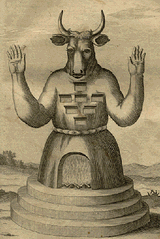Search Results
6/29/2025, 8:58:08 AM
>>17799842
>Moloch is a verb describing a blood sacrifice
This is based on the fact that mlk is used as an adjective for sacrifice in Punic Tophets and there is no mention of a deity named Moloch in Canaan. The problem is that Moloch is not a real name, it is a corruption from combining the consonants of the Hebrew melech (“king”) with the vowels of boshet (“shame”), the latter often being used in the Old Testament as a variant name for the popular god Baal-Hadad. There are a number of Canaanite gods with names based on this root, which became summarily associated with Moloch, including biblical Milcom, which appears to refer to a god of the Ammonites, as well as Tyrian Melqart and others.
>Traditionally, Molech has been understood as the name of a deity to whom children were burned in sacrifice, first by the Canaanites and then by the Israelites, particularly in a cultic installation known as the “Tophet” in the Valley of the Son of Hinnom, immediately south of Jerusalem. In favor of this understanding there is now a broad range of Ancient Near Eastern literary evidence which suggests the worship of a god known as Malik or Milku/i from as early as the 3d millennium b.c. through the OT era. Malik was an extremely popular element in personal names at Ebla, although contexts are presently too scanty to permit firm conclusions regarding the god’s nature in the Eblaite cultus
>The same god is also evidenced in personal names from the next (i.e., second) millennium at Mari, and in addition, we find in the Mari texts references to recipients of funeral offerings called maliku, apparently the shades of the dead or underworld deities. This netherworld connection is reinforced by the evidence from Akkadian texts, in which Malik appears in god lists, from the Old Babylonian period on, equated with Nergal and in which the mal(i)kū appear in connection with the Igigi and Anunnaki as chthonic beings involved in the cult of the dead ancestors
>Moloch is a verb describing a blood sacrifice
This is based on the fact that mlk is used as an adjective for sacrifice in Punic Tophets and there is no mention of a deity named Moloch in Canaan. The problem is that Moloch is not a real name, it is a corruption from combining the consonants of the Hebrew melech (“king”) with the vowels of boshet (“shame”), the latter often being used in the Old Testament as a variant name for the popular god Baal-Hadad. There are a number of Canaanite gods with names based on this root, which became summarily associated with Moloch, including biblical Milcom, which appears to refer to a god of the Ammonites, as well as Tyrian Melqart and others.
>Traditionally, Molech has been understood as the name of a deity to whom children were burned in sacrifice, first by the Canaanites and then by the Israelites, particularly in a cultic installation known as the “Tophet” in the Valley of the Son of Hinnom, immediately south of Jerusalem. In favor of this understanding there is now a broad range of Ancient Near Eastern literary evidence which suggests the worship of a god known as Malik or Milku/i from as early as the 3d millennium b.c. through the OT era. Malik was an extremely popular element in personal names at Ebla, although contexts are presently too scanty to permit firm conclusions regarding the god’s nature in the Eblaite cultus
>The same god is also evidenced in personal names from the next (i.e., second) millennium at Mari, and in addition, we find in the Mari texts references to recipients of funeral offerings called maliku, apparently the shades of the dead or underworld deities. This netherworld connection is reinforced by the evidence from Akkadian texts, in which Malik appears in god lists, from the Old Babylonian period on, equated with Nergal and in which the mal(i)kū appear in connection with the Igigi and Anunnaki as chthonic beings involved in the cult of the dead ancestors
Page 1
